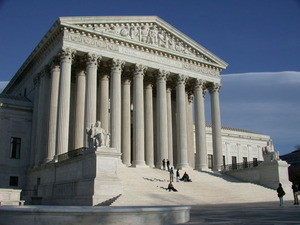GLEN COVE, NY—Bad Supreme Court decisions spread like cancer and are based on a form of idolatry.
Consider Roe v. Wade, for example. Fifty years ago, Sweden was the only nation in the civilized world that did not have criminal penalties for most abortions. Today, the dominant culture of the Western world regards abortion as acceptable. Many people irrationally decided that if the Supreme Court said abortion was all right, it must be all right. Many other people decided that if America practiced abortion, it must be the right thing for their country as well. Just like cancer, abortion spread throughout the West, and indeed most of the world.

The Griswold case involved the constitutionality of the last two state laws against distributing contraceptives. At the time, the dominant Protestant elite in America believed in contraception and probably over half the country agreed. No rational person could argue that the Constitution actually prohibited laws against contraception. The Supreme Court, however, held that emanations from penumbras of the Constitution did so. In order to understand how the Supreme Court could adopt a wicked logical extension of an absurdity, one must understand the theoretical basis underlying such an action. The classical view of the power of government, derived largely from Aquinas and Blackstone, is that neither custom nor government may legitimately override the laws of God. Government may override custom but may not override God. While custom may have the force of law as long as it conforms to nature, government may override it. The earliest challenge to the classical view was positivism, which began in the nineteenth century. This philosophy essentially denied natural law and defined law as whatever the “sovereign” or government said the law was. A number of American modifications of positivism have been taught in law schools over the last century. These include such ideas as the following:
• The law is whatever people expect judges to say.
• The law is what the judges say, but the judges should try to achieve good results.
• The words in the law books are objective facts, but law is a science of deciding what they mean.
• The law is simply an exercise in raw power. All of these depart radically from the classical view. These jurisprudential theories were a form of relativism, that is, they deny the existence of objective truth.
In the 1938 case of Erie R. R. v. Thompkins, the Supreme Court decided to abandon the practice it had followed of attributing an objective meaning to propositions of English law that pre-dated 1775. The Court instead held that such propositions could mean one thing in one state and another thing in another state. It endowed every state supreme court with the power to invent its own truth. It banished truth from American law, something leading scholars had been seeking for a generation.
The law rightly does not like courts to change their minds too much. Once the objective existence of truth is denied, it becomes much easier for bad decisions to generate more bad decisions like cancers.
Once the existence of truth is denied, every judge, congressman, president, and administrator has the right to make his own truth. Truth is, however, created by God. Men have certain power to define it, but even this power is limited. Humans can infallibly declare that Christian dogma has an unchangeable meaning, that Jesus Christ is true God and true Man, and that the Blessed Virgin was bodily assumed into Heaven, but they cannot infallibly declare that the earth is the center of the universe.
God is all powerful and could have created a universe without truth, but he did not. He created a universe of many trillions of objective truths. For example, it is a simple truth that the sum of two sums is equal to the sum of the parts of the two sums. It is the way God made the universe. It is also a simple truth that deliberately and directly killing innocent human babies is wrong. This is also the way God made the universe.
When the Supreme Court says that governments have no right to prohibit the killing of innocent babies, it sets itself up as an idol in opposition to God. When people say that the Supreme Court has approved abortion and that is the end of the story, they are as guilty of idolatry as those who bow down before golden calves.A court not bound by the chains of truth will hand out falsehoods that will spread like cancer. If those infected believe that truth should not bind the court, they too become idolaters.
